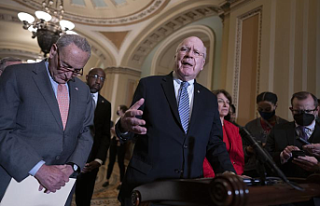India calls the doses a "precautionary" shot and not a booster. This was after coronavirus cases rose to nearly eightfold in one week. Although hospitalizations are still relatively low in India, Mumbai, and Kolkata, they are beginning to increase in large, crowded cities like New Delhi, Mumbai, and Kolkata.
Dr. Ravindra Kumar dewan, the head of the National Institute of Tuberculosis and Respiratory Diseases (New Delhi), waited in line for his shot. He stated that boosters were a "significant step", as there are still many unanswered questions about the omicron version.
"Yesterday, Delhi's mortality has increased." He said that it was yet to be determined if the health care system will become overwhelmed.
India is now better prepared than last year, when the delta variant overtook hospitals. Nearly 1% of India's population of almost 1.4 billion were fully vaccinated when cases rose in March 2013. Millions of Indians died due to India's crumbling medical infrastructure.
Since then, the government have increased healthcare and built oxygen plants. Nearly 47% of the population are now fully vaccinated, and many people have antibodies from prior infections. This could provide "hybrid immunity", which is a combination immunity from previous infections and vaccines. It's comparable to boosters, according to Dr. Chandrakant Lahariya an Indian epidemiologist.
Although the omicron variant appears to cause less severe disease than the delta variant of the virus, India's large population, crowded cities and understaffed hospitals means that India's health system may be more difficult. The more dangerous variant could spread further through elections, infecting vulnerable people who were not previously infected. The biggest worry is that hospitals may be overwhelmed by sick medical staff, according to Dr. Vineta Bal, an Indian Institute of Science Education and Research immunologist in Pune.
She stated that there would be beds in hospitals, but not enough people to care for individuals.
India's hospitals have a shortage of staff at times, and the distribution of health workers across states is uneven. Hospitals are already suffering from the disease, with hundreds of healthcare workers becoming ill. Some hospitals have stopped routine service and have relaxed quarantine rules.
"Every third doctor has a diagnosis. There is an acute shortage in staff. There is an acute shortage of staff," Dr. Anuj Agarwal, a New Delhi-based physician at Safdarjung Hospital (one of India's largest public hospitals), stated.
According to Dr. Prabhat K, who is in charge of COVID-19 treatment at Rajendra Institute of Medical Sciences Ranchi, 25% of 800 health workers had mild infections.
According to Dr. T. Jacob John (ex-chief of virology at Christian Medical College, southern India), delays in providing boosters can be costly. According to him, health workers would be put under additional pressure if they had to administer third shots in the event of a hospital overflowing.
Belated boosters will be given to high-risk individuals who were among those first to get vaccines last year, and whose immunity is waning. Contrary to other countries where people get different vaccines as boosters, Indians will all receive the same vaccine, which is the AstraZeneca vaccine manufactured by India's Serum Institute. This vaccine is the largest in the world. This is a relatively limited benefit, and India had hoped to have more vaccines so it could mix the booster shots Lahariya stated.
He stated, "India doesn't have that kind choice."
Nearly 90% of Indian doses of the AstraZeneca vaccine from Serum Institute have been administered, even though eight other vaccines have received emergency approval.
Some Indian vaccine manufacturers have faced manufacturing difficulties, while others, such as Moderna or Johnson & Johnson, have requested protection from lawsuits regarding side effects. India has not been willing to grant this protection.
India's vaccination drive has been slow. As of 2021, around 30% of India's population was not fully vaccinated. The vaccinations for the below 18-year-olds, which represent a third of India’s population, began last week.
There are many states that have different rates of vaccination. For example, 75% in northern Himachal Pradesh and 31% in eastern Jharkhand, which is among India's poorest.
Bal, an immunologist, stated that "these gaps will definitely get exposed."












